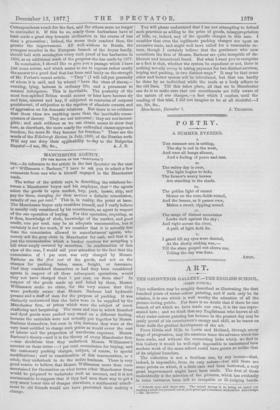THE STAFFORD HOUSE COMMITTEE. [To THE EDITOR OW THE "SPECTATOR."]
SIR,—The papers of November 26 contained a little piece of intelligence which I fully expected the Spectator to notice, as it affords curious information about the point of view from which the Turkish party in this country regard affairs in the East. As you have not made any observation upon it, I almost think it must have escaped your attention. You will remember that after one of the battles at Dubnik two English surgeons were- taken among the Turkish prisoners, and that these surgeons —supposing, I presume, that it would never be out of place for English gentlemen to speak the truth, bore witness to the murder and mutilation of the Russian wounded by the Turks, after a. repulse which the Russians had suffered a few days before. As soon as intelligence of this reached Constantinople, we were told (and up to this time I believe the statement has not been con- tradicted) that Mr. Kennett, acting, it would appear, under the direction of the" Stafford House Committee " issued a circular to all the doctors employed by that Committee, enjoining them to- give no information which might be politically or otherwise (I think the phrase was) of service to the Russians. That is to say,. this Committee, composed of English noblemen and gentlemen, organised ostensibly for the purposes of humanity, virtually orders its agents to make themselves accessories after the fact, to a crime- which is, in the mouths of those who think with them, one of the stock-charges against the Russian army of a quarter of a century ago. Is it uncharitable, after this, to suppose that an absolute preference for a bad cause is at the bottom of some of the talk. about " British interests," or is the mythical " Perish India !" to be met with " Perish honesty and humanity "?
While I am on this subject, may I further remark that the Russophobist party show a great lack of acuteness in brining up that old Crimean charge. It is, I believe, admitted now on all hands that the Russians have treated their enemy's wounded in the present war with all possible kindness ; at least one set of
Correspondents vouch for the fact, and the others seem no longer to contradict it. if this be so, surely these barbarians have at least made a great step towards civilisation in the course of less than a generation ; indeed, the worse their conduct then, the greater the improvement. All well-wishers to Russia, the youngest member in the European branch of the Aryan family, should hail with satisfaction every such proof of her barbarism in 1854, as an additional mark of the progress she has made by 1877.
In conclusion, I should like to give you a passage which I have just come across, and which seems to mo to express rather neatly the answer to a good deal that has been said lately on the strength of Mr. Forbes's recent article. " They" (I will tell you presently of whom it is said, and by whom) "have the vices of slaves,— cunning, lying, laziness in ordinary life, and a proneness to sensual indulgence. This is inevitable. The posterity of the moat free-spirited Briton would sooner or later have become sly and false, sensual and lazy, if subjected to centuries of corporal punishment, of subjection to the caprices of absolute owners, and of aggression on his domestic relations. But there is no evidence that these vices are anything more than the inevitable conse- quences of slavery. They are not universal ; they are not incorri- gible ; and such evidence as we can obtain seems to show that here, as elsewhere, the more nearly the enthralled classes approach freedom, the more fit they become for freedom." These are the words of the Edinburgh Review, in July, 1860, of the Russian serfs. Will any one deny their applicability to-day to the Bulgarian











































 Previous page
Previous page